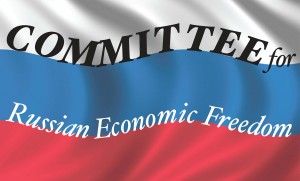Russian Roulette – Current Investment Risks in Russia – By the Committee for Russian Economic Freedom
 An overview of Russian economic and investment issues with selected cases of rule of law violations in Russia for discussion at the World Economic Forum, especially for the discussion on January 28, 2010 on “Strengthening the Rule of Law.”
An overview of Russian economic and investment issues with selected cases of rule of law violations in Russia for discussion at the World Economic Forum, especially for the discussion on January 28, 2010 on “Strengthening the Rule of Law.”
January 26, 2010
Dear World Economic Forum Attendee:
While at the World Economic Forum, keep in mind that in a cramped court room just a fewblocks from the Kremlin a drama is playing out that will have profound implications for thefuture of economic and political freedom in Russia. That country’s former leading businessleader, YUKOS Chairman Mikhail Khodorkovsky, is undergoing a bizarre second trial onfabricated charges after he criticized Vladimir Putin for failing to abide by the rule of law.Sentenced to eight years, Khodorkovsky now faces an additional 22 years in a Siberian prisoncamp.This Kafkaesque proceeding embodies everything that stands in the way of Russia achievingstability, growth, prosperity and Democracy for its people. GDP surges and plummets with oilprices, inflation and unemployment each exceed 10 percent, while the average salary is about$500 a month. Respected companies like IKEA, the Swedish home furnishings giant, have beenforced to declare a moratorium on investment in Russia, frustrated by Russian officials’disregard for contractual obligations and fair play.As a U.S. Senator, President Obama sponsored a bi-partisan resolution supporting Khodorkovskyafter the first prosecution, stating that the case raises “troubling questions about the impartialityand integrity of the judicial system in Russia,” and that the imprisonment represents “a violationof the norms and practices of Russian law.” Other leaders from Italy, Germany, and Europeanorganizations joined in extending their support for Mr. Khodorkovsky. Courts from Switzerland,the United Kingdom, the United States, Netherland, Lithuania, and Cyprus, among others, havedismissed elements of the YUKOS affair.The Russian government’s contempt for the Rule of Law and the simultaneous proliferation of corruption remains a huge impediment to direct foreign investment for this key player in theworld economy. Both US and Russian officials have publicly acknowledged Russia’s weak property rights and rampant corruption as reasons to avoid doing business in Russia.Russian First Deputy Prime Minister Igor Shuvalov said at an international conference onJanuary 21, 2010, “Investment…is possible only with solid protection of private property rights.Therefore this problem is directly linked to the course of modernization.” On January 12, 2010US Ambassador to Russia John Beyrle stated, “Russia is still a very tough place to do business.The combination of bureaucratic and administrative obstacles intertwined with pervasive corruption in Russia still constitutes a pretty significant risk premium for American investors andAmerican businessmen who want to enter the Russian market or grow their businesses.”Russian attorney Sergei Magnitsky was arrested in November 2008 after defending HermitageCapital against expropriation by government officials. After being denied medical treatmentduring his year-long incarceration, Magnitsky died in Russian custody last November. If this canhappen to Khodorkovsky and Magnitsky, what investor or corporation seeking to do business inRussia is safe? Why invest in Russia as long as Khodorkovsky is behind bars?According to Russian government studies and US State Department statistics, it’s estimated thatcorrupt officials rob the Russia people of an estimated $300 billion annually, a sum equal to 18%of the country’s gross domestic product. The response to the newly-adopted package of anti-corruption legislation initiated and promoted by President Medvedev and passed by the Duma inDecember 2008, has been tepid at best. Medvedev recently admitted publicly that corruption isstill endemic in Russia. The excessive role of government in the economy and business sector,which spurs the supply side of corruption, aggravates the problem.As 2010 begins, signs of Russia’s complacency have become larger and the world stage isbeginning to notice. The Khodorkovsky trial and continued politicization of the courts and trade illustrate the increasingly hostile nature of the Russian business environment.
Kind regards,
Pavel Ivlev
Chairman
Committee for Russian Economic Freedom





